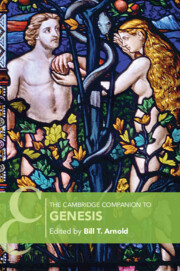Book contents
- The Cambridge Companion to Genesis
- Cambridge Companions to Religion
- The Cambridge Companion to Genesis
- Copyright page
- Contents
- Abbreviations
- Contributors
- 1 Introduction: Genesis and the status quaestionis
- Part I Composition and Structure of Genesis
- Part II Social World of Genesis
- Part III Themes and Literary Motifs of Genesis
- 10 From Imago to Imagines: The Image(s) of God in Genesis
- 11 Genesis, Science, and Theories of Origins
- 12 Genesis and Ethics
- 13 Genesis and the Problem of Evil: Philosophical Musings on the Bible’s First Book
- Part IV Reception History of Genesis
- Scripture Index
- Subject Index
- Cambridge Companions to Religion (continued from page iii)
- References
11 - Genesis, Science, and Theories of Origins
from Part III - Themes and Literary Motifs of Genesis
Published online by Cambridge University Press: 02 June 2022
- The Cambridge Companion to Genesis
- Cambridge Companions to Religion
- The Cambridge Companion to Genesis
- Copyright page
- Contents
- Abbreviations
- Contributors
- 1 Introduction: Genesis and the status quaestionis
- Part I Composition and Structure of Genesis
- Part II Social World of Genesis
- Part III Themes and Literary Motifs of Genesis
- 10 From Imago to Imagines: The Image(s) of God in Genesis
- 11 Genesis, Science, and Theories of Origins
- 12 Genesis and Ethics
- 13 Genesis and the Problem of Evil: Philosophical Musings on the Bible’s First Book
- Part IV Reception History of Genesis
- Scripture Index
- Subject Index
- Cambridge Companions to Religion (continued from page iii)
- References
Summary
Discussions of religious faith and science have proceeded along four tracks: science, philosophy, systematic theology, and scriptural interpretation. The dominant dialogue between theology and science is mediated by philosophical categories. While less prominent, the engagement of science and Scripture has been addressed in several intersecting classifications each with a specific focus. James P. Hurd sketches three scenarios seeking to harmonize the paleontological record of humans origins with Scripture.1 Nicolaas Rupke surveys five discourses about Scripture and science in their social context from 1750 to 2000.2 Gijsbert van den Brink describes five types of interpretation of Genesis 2–3, addressing the historicity of Adam and the Fall.3 Deborah Haarsma and Loren Haarsma as well as Denis Alexander distinguish attempts at creating consistency between science and Scripture (scenarios, models).4 Mark Harris addresses the “neglect of the Bible by the science-religion field” more broadly.5 All aim at conflict resolution.
- Type
- Chapter
- Information
- The Cambridge Companion to Genesis , pp. 236 - 261Publisher: Cambridge University PressPrint publication year: 2022



